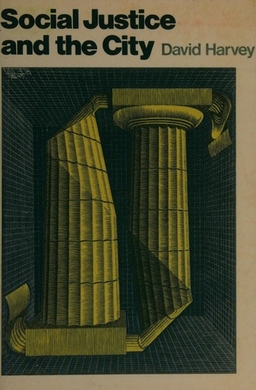Related Research Articles

A geographer is a physical scientist, social scientist or humanist whose area of study is geography, the study of Earth's natural environment and human society, including how society and nature interacts. The Greek prefix "geo" means "earth" and the Greek suffix, "graphy", meaning "description", so a geographer is someone who studies the earth. The word "geography" is a Middle French word that is believed to have been first used in 1540.

Economic geography is the subfield of human geography that studies economic activity and factors affecting it. It can also be considered a subfield or method in economics. There are four branches of economic geography.

David W. Harvey is a British-American academic best known for Marxist analyses that focus on urban geography as well as the economy more broadly. He is Distinguished Professor of anthropology and geography at the Graduate Center of the City University of New York (CUNY). Harvey has authored many books and essays that have been prominent in the development of modern geography as a discipline. He is a proponent of the idea of the right to the city.
Political geography is concerned with the study of both the spatially uneven outcomes of political processes and the ways in which political processes are themselves affected by spatial structures. Conventionally, for the purposes of analysis, political geography adopts a three-scale structure with the study of the state at the centre, the study of international relations above it, and the study of localities below it. The primary concerns of the subdiscipline can be summarized as the inter-relationships between people, state, and territory.
Regional economics is a sub-discipline of economics and is often regarded as one of the fields of the social sciences. It addresses the economic aspect of the regional problems that are spatially analyzable so that theoretical or policy implications can be the derived with respect to regions whose geographical scope ranges from local to global areas.

Edward William Soja was an urbanist, a postmodern political geographer and urban theorist. He worked on socio-spatial dialectic and spatial justice.
Mark Stephen Monmonier is a Distinguished Professor of Geography and the Environment at the Maxwell School of Citizenship and Public Affairs of Syracuse University. He specializes in toponymy, geography, and geographic information systems.
Neil Robert Smith was a Scottish geographer and Marxist academic. He was Distinguished Professor of Anthropology and Geography at the Graduate Center of the City University of New York, and winner of numerous awards, including the Globe Book Award of the Association of American Geographers.

John A. Agnew, FBA is a prominent British-American political geographer. Agnew was educated at the Universities of Exeter and Liverpool in England and Ohio State in the United States.

The sociology of space is a sub-discipline of sociology that mostly borrows from theories developed within the discipline of geography, including the sub fields of human geography, economic geography, and feminist geography. The "sociology" of space examines the social and material constitution of spaces. It is concerned with understanding the social practices, institutional forces, and material complexity of how humans and spaces interact. The sociology of space is an inter-disciplinary area of study, drawing on various theoretical traditions including Marxism, postcolonialism, and Science and Technology Studies, and overlaps and encompasses theorists with various academic disciplines such as geography and architecture. Edward T. Hall developed the study of Proxemics which concentrates on the empirical analysis of space in psychology.
The neighborhood effect is an economic and social science concept that posits that neighbourhoods have either a direct or indirect effect on individual behaviors. Although the effect of the neighbourhood was already known and studied at the beginning of the 20th century and as early as the mid 19th century, it has become a popular approach after the publication of the book The Truly Disadvantaged by William Julius Wilson in 1987. Wilson's theory suggests that living in a neighbourhood seriously affected by poverty affects a wide range of individual outcomes, such as economic self-sufficiency, violence, drug use, low birthweight, and cognitive ability. Many scholars and activists consider Wilson's book, “The Truly Disadvantaged” the "bible" of scholarship on the neighborhood effect. “The Truly Disadvantaged” has been a stepping stone for a great deal of research on the neighbourhood effect, particularly on education, exploring the impacts of one's neighborhoods on an individual's outcome and performance in life. Since Wilson there has been a substantial literature written on neighborhood effects and many challenges remain.
Yehua Dennis Wei is a Chinese-American geographer. He is a professor in the Department of Geography and a senior scholar in the Institute of Public and International Affairs at the University of Utah. His research has been funded by the NSF, Lincoln Institute of Land Policy, National Geographic Society, Ford Foundation and Natural Science Foundation of China (NSFC). He has received awards for research excellence from the NSFC, Association of American Geographers' (AAG) China, Asian and Regional Development and Planning Specialty Groups, and University of Wisconsin-Milwaukee.

George Babcock Cressey was an American geographer, author, and academic. Born in Tiffin, Ohio, he attended Denison University and then the University of Chicago, where he received a PhD in geology. After receiving his degree, he taught at University of Shanghai and traveled widely in China. Upon his return to the United States in 1929, he completed a pioneering book on the country, China's Geographic Foundations.
Reginald George Golledge was an Australian-born American Professor of Geography at the University of California, Santa Barbara. He was named Faculty Research Lecturer for 2009. During his career, he wrote or edited 16 books and 100 chapters for other books, and wrote more than 150 academic papers.

The following outline is provided as an overview of and topical guide to geography:

Ronald J. Horvath has made contributions to the study of colonialism, African development, and urban geography of Sydney, Los Angeles, Detroit and Addis Ababa.

Social Justice and the City is a book published in 1973 written by the Marxist geographer David Harvey. The book is an attempt to lay out afresh the paradigm of urban geography, by bringing together the two conflicting theses of methodology and philosophy. Going against the grain of his previous book Explanation in Geography published in 1970, he argued that geography cannot remain disengaged, impartial and 'objective' at a time when urban poverty and associated ills were reigning high.

John Rennie Short is professor emeritus of geography and public policy in the School of Public Policy at University of Maryland, Baltimore County.
David Howard Kaplan is an American geographer, academic, and author. He is a professor of geography at Kent State University.
References
- ↑ WorldCat Identities
- ↑ Jonas, Andrew E. G., and Andrew Wood. Territory, the State and Urban Politics A Critical Appreciation of the Selected Writings of Kevin R. Cox. Farnham, Surrey, England: Ashgate, 2012. ISBN 9780754699798
- ↑ "Transmuting the Remains of the Industrial Metropolis: On Kevin R. Cox's "Boomtown Columbus"". Cleveland Review of Books. Retrieved 2021-12-02.